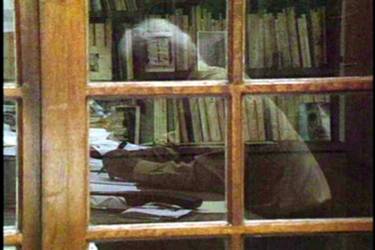 goodbye, J.D. ... July 15, 1930 - October 9, 2004
goodbye, J.D. ... July 15, 1930 - October 9, 2004
I had thought about this happening, but didn't expect it so soon.
Jacques Derrida, writer of deconstruction but of so many more words, of arcs and deferrals, delays and refraction, violence and spirit, articulate in several different languages, translator and orator, activist and researcher, organiser and grandfather, died yesterday, October 8th, 2004, in a Paris hospital of pancreatic cancer. He had refused treatment.
I never knew Derrida, I never attended his lectures, I have always been too busy, it seems, to find the chance, and now that chance has passed. I told a good friend (and myself) upon hearing of his cancer that I would visit him this Spring of 2005 to catch what I imagined to be one of his last. I have waited too long.
Adieu, Jacques Derrida. To an influence and an enigma, an inspiration.

Your words will not forever be marked by the controversy so easily supplied by today's journalism (BBC, Yahoo). You are rarely "obscure," never "absurd" unless superbly sharp. Even in writing your humour conveyed its strength, the agility of your mind. But also your wit and your cutting incisions: you were a fighter.
The first time I encountered "deconstruction," in first year Literary theory, its presentation as a theory of relativity of the sign had me intrigued but suggested I was only getting a fraction of the story. So I picked up Of Grammatology, read it, started a reading group to re-read it, and entered into a reading process that has occupied me to this day. I have been reading Derrida for seven years, and I have only touched upon a quarter of his oeuvre at best. It took me five years to properly read and finish Of Grammatology, five years to read the primary level of his sources (Rousseau and Levi-Strauss, mainly). Reading Derrida is like reading Proust; both seduce you into a lifetime engagement. Both inscribed their lives with their deaths.
I have come across criticisms, approaches and teachers that have led me to different paths to understanding Derrida. And as I approach the specter of having to teach Derrida myself, I find myself confronted not by his impenetrability, but the magnitude of the starting point. At which point do you begin with Derrida? A text that, for me, was the first key to his work, to understanding his generosity, his gift of words and argument, and his process of reading was The Gift of Death. I began to suspect he had much more to do with death, memory and time than simple semiotic relativity. Reading a substantial amount of Heidegger and Freud began to confirm this inkling. Literary theory had packaged and reduced him as much as cultural studies had turned his criticality to simple critique.
The second key--perhaps the lock--was Limited Inc, the collection of essays and parries to John Searle over the subject of Austin's theories of performativity. I finally realised the broader connection to Heidegger--to analysing the clues Heidegger left in his "uncompleted" Being and Time, that the investigation of Being (that is, really, the very question of philosophy), would have to be rethought from language and time. Sometimes I think this is Derrida's most significant contribution: it could be argued that he has, in some respects, written the second half of the "missing" Heidegger. It is his life's work.
Finally, Derrida's work on incorporation that guided much of his later work, his "hauntology," can be found in his introduction, "Fors," to Abraham and Torok's The Wolfman's Magic Word. Discovering "Fors" suddenly made me realise the door I was opening with my key and lock barred a crypt; it opened unto death. In this respect, I was struck by the intensity of his theory of performativity of language. I became suspect of the banal analysis of his "relativity." Relativity/objectivity are not the pivot of his understanding--rather, one begins with that of the event, of necessity, of language, of force, of context.
Jodey Castricano's incredible study, Cryptomimesis, which I was lucky enough to read in manuscript form in 2001 (my thesis supervisor, Lorraine Weir, was also Castricano's), began to irrevocably alter my perception of Derrida. Hardly ambiguous, his "politics," although later elaborated in terms of a messianism, a to-come (a-venir), were also radical and in the broadest sense. Concerned, that is, with roots and radi. The work of Jean-Luc Nancy and Philippe Lacoue-Labarthes on the political, and in the footsteps of Derrida, are oft misunderstood in North America for these reasons. It is no surprise that many remain confused when I say that Derrida, and not Deleuze, politicized much of my practice.
A death effects you, some more than others, and some the most distant and removed the most.
posted. Sat - October 9, 2004 @ 04:25 PM |
..ziP:
./them.hallucinates./.
.this blog sketches words & links from tobias c. van Veen -- renegade theorist & pirate. Everything here is in-progress, often a mess of thoughts and poorly edited grammar.


.. categories
..calendar //
| Sun | Mon | Tue | Wed | Thu | Fri | Sat |
.. @rchives //
XML/RSS feed.me //
numbers that mean little:
absolut numerosity..:
...puplished 0n: Oct 09, 2004 04:46 PM
...puplished 0n: Oct 09, 2004 04:46 PM